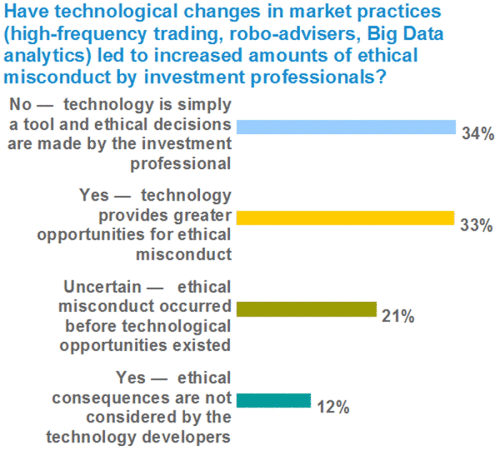Does Technology Test Ethical Foundation of the Investment Profession?
At CFA Institute we believe there are some fundamental ethical principles that are the foundation of the investment industry. These principles include putting investors’ interest first, avoiding or mitigating conflicts of interest, displaying loyalty, prudence, and care when acting for clients, and upholding the integrity of the market, among many others. If ethical conduct is the foundation, then technology represents the winds of change that test that foundation.
Technology has advanced significantly over the past four decades. From the ability to download documents directly from a regulator’s website to having news and share price information at your fingertips from a multitude of handheld devices, investors benefit as information is much more readily available today.
Analytical practices also have greatly benefited from improved technology. In the 1980s, the HP12C financial calculators helped speed the calculations underpinning financial analysis. Today computer-based analytical models can go beyond highlighting appropriate investments by actually making those trades on your behalf.
It is important for us to consider that the positive elements of these changes must be balanced with the potential impact on the ethical foundation of the industry. The benefits of new technology may not impact all investors equally. However, its implementation should not directly disadvantage some investors through enabling actions that conflict with the fundamental ethical principles of the capital market.
To gain a better understanding of how investment professionals viewed more recent technological changes, CFA Institute recently conducted a poll in its Financial NewsBrief newsletter.
Source: CFA Institute Financial NewsBrief
Nearly half, or 45%, indicated that technology has led to more unethical activity, with 12% responding that technology developers do not consider the ethical consequences of their new tools. As individuals trained in computer sciences and mathematics continue to have a greater presence in the investment industry, often without any direct client interaction, it is increasingly important that everyone in the industry consider the ethical consequences technology adoption can create.
CFA Institute introduced the Claritas® Program as a way to address the essentials of finance, ethics, and investment roles to a wide range of investment industry participants, beyond the typical CFA Institute member. The knowledge gained through this program should facilitate the necessary discussions in determining whether the benefits actually outweigh the cost of introducing the new technology.
The media often have no trouble painting the negative side of technological changes. Just look back to all the headlines generated when Flash Boys was published last year. However one in three of our survey respondents say that technological changes can be introduced in a manner that does not impact the ethical balance of the industry.
There is some murkiness around how ethical actions may be influenced by technology — two in 10 respondents could not definitively identify which side came out on top. With the ongoing pace of technology enhancements we’re likely to see this level of indecision remain.
Clearly, technology is aiding in the evolution of market practices. It is the changes in market practices, and not simply the introduction of new technology, that attracts the attention of CFA Institute. Our examinations of market innovations seek to understand both the positive and negative effects of its implementation. This leads to our developing positions on the innovations that support the integrity of capital markets and not just promoting the benefits brought to our members.
Our positions fall back to expectations we have for members as they abide by the fundamental ethical principles of the Code of Ethics and Standards of Professional Conduct. Technology should enable investment professionals to work in the best interests of their clients in an effectively functioning capital market that promotes integrity and ultimately benefits the society.
If you liked this post, consider subscribing to Market Integrity Insights.
Image credit: iStockphoto.com/maxkabakov



Technology is a tool – not, IMHO, inherently good or bad. When used for the greater good, it should reduce costs, increase transparency, offer audit trails and ease educational access. Is there not some way to enhance the odds for achieving these outcomes?
Thank you Glenn for an interesting and timely article. I agree to Celia, but would go further. The Code of Ethics and Standards is also a tool. A real question may be – what organizational and personal factors determine investment professonals’ motivation to serve their clients, rather than to spend time to comply. The same applies to regulations.
Thanks for your comments. Technology and regulations both have potential to change behavior of capital markets participants. Often technology is out in front of regulatory initiatives, which leads to concerns about the new market practices. In these situations, the ethical expectations established in the Code and Standards provide guidance to those applying the new technology. By making decisions that consider the interests of investors and the integrity of markets, as well as the bottom line of the firm, new technologies can inspire societal benefits.